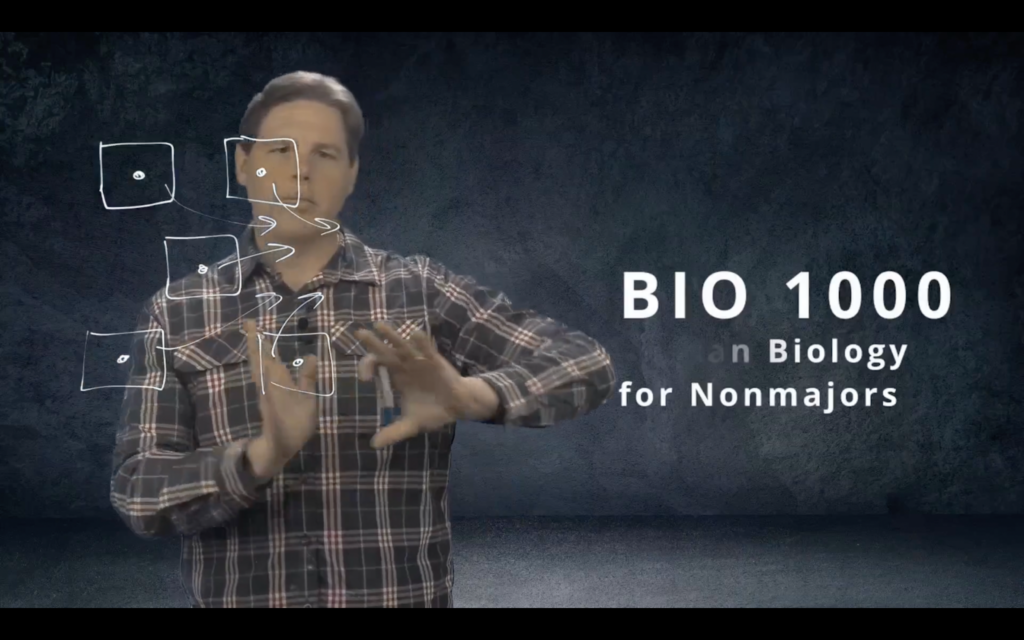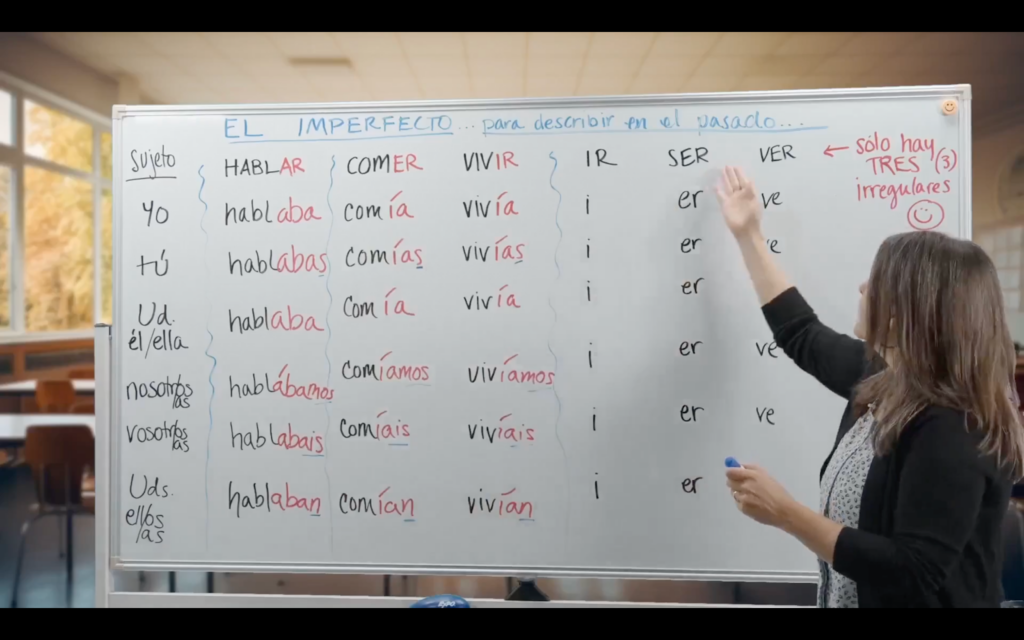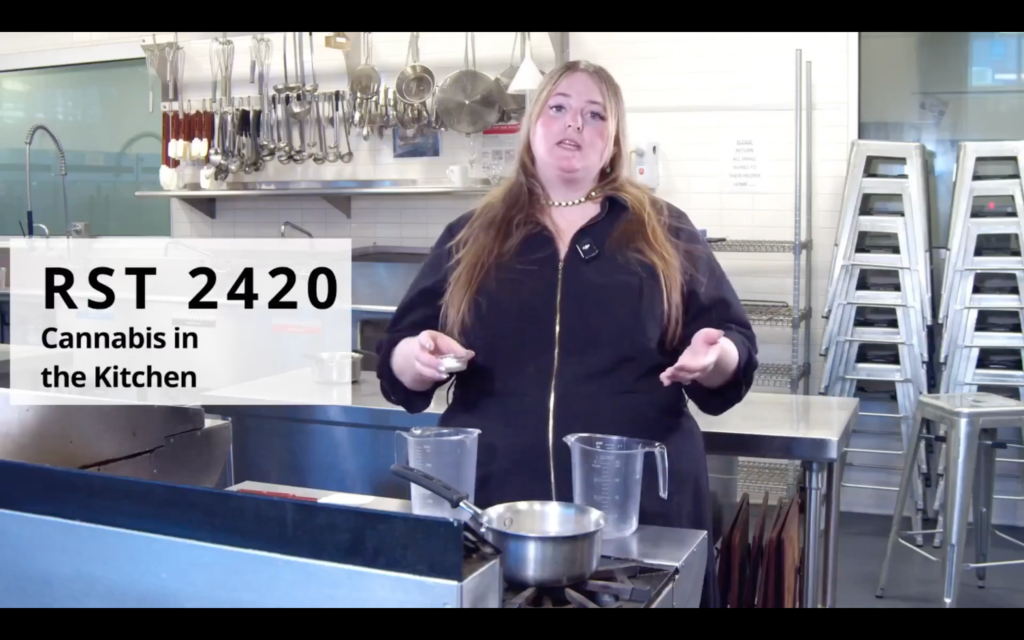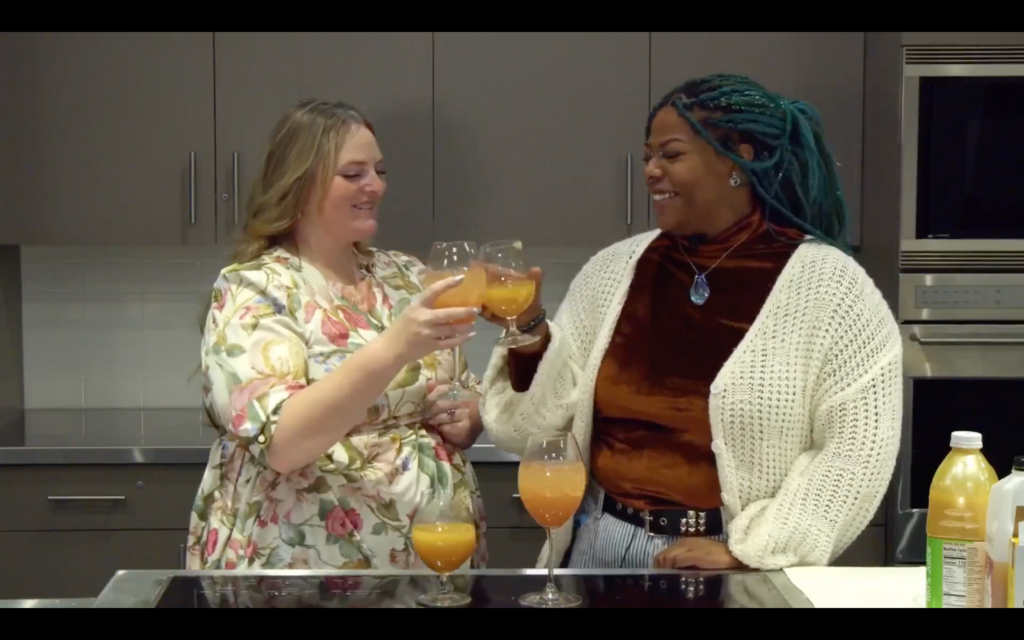Last updated on October 9, 2025
MSU Denver educators are revolutionizing the way students engage with material, using multimedia techniques to create immersive, interactive, and impactful learning experiences. Three standout courses from the Fall 2024 semester showcase how innovative design and technology can transform education. Educators collaborate with the CTLD media team to combine cutting-edge multimedia techniques with proven learning principles. These courses provide robust learning experiences across diverse disciplines, reshaping traditional approaches to teaching and learning.
Contents
Showcase Examples
BIO 1000: Personalization and Embodiment
First, in BIO 1000, Human Biology for Non-Majors, Dr. Jonathan Dyhr wanted to expand on how biological concepts can be taught by leveraging the CTLD studio lightboard. He explained complex topics through real-time drawing, blending visuals with clear, conversational explanations. He also used the studio green screen for slide deck presentations, styled after a “weather-person” format. This made abstract concepts more tangible by allowing him to interact with slides as if they were right beside him. These approaches incorporate the Personalization and Embodiment Principles of Richard Mayer’s Theory of Multimedia Learning, which emphasizes the importance of conversational tone, gestures, and facial expressions to create a human connection with learners.

Dr. Dyhr’s focus on concise videos aligns with the Segmenting and Pre-Training Principles of the same theory, breaking content into manageable parts and introducing key terms from the start. This approach will prepare students to independently explore the material through readings and assignments, keeping their attention while fostering deeper understanding. His passion for teaching and innovative techniques will make BIO 1000 a rewarding experience for all students.
SPA 1020: Driven by Multimedia
For students learning Spanish, SPA 1020: Elementary Spanish II provides a rich, multimedia-driven experience, thanks to the efforts of Professors Wendy S. Gallagher, often accompanied by María A. Rey-López. Drawing on her four years living in Spain, Professor Gallagher infused the course with cultural authenticity and practical application. The course includes 34 instructional videos and 8 audio recordings, blending grammar lessons, cultural insights, and real-life scenarios.

Following the Segmenting Principle, complex grammar topics like direct and indirect object pronouns are broken into smaller, more digestible steps. The Personalization Principle is evident in Professor Gallagher’s conversational teaching style and on-screen presence, making her relatable to students while building a stronger connection. With AI-generated backgrounds and creative simulations of everyday situations, the course helps immerse students in Spanish-speaking cultures and helps them build confidence in their language skills.
RST 2420: Innovative Multimedia
RST 2420: Cannabis in the Kitchen stands out as one of MSU Denver’s first online cannabis-infused cooking courses. Shannon Donnelly, Affiliate Faculty in the Hospitality Department partnered with the CTLD media team to produce 23 professional videos filmed in both the CTLD media studio and the Hospitality Department kitchen classrooms on campus. The course covers infusion techniques, dosage, and recipe development for food and beverages, offering practical, hands-on instruction. This was the first time the media team could facilitate a live multi-camera recording, utilizing on-the-go video production equipment and the kitchen ceiling cameras. Instead of a lecture, the videos were made to simulate a “cooking show” style, focusing on techniques and processes with closeups and a presentation of the final products.

Richard Mayer’s Embodiment and Signaling Principles are integral to the course’s design. The instructor’s on-screen presence, combined with guest lectures from industry experts, provides practical knowledge and real-world perspectives. Detailed visual demonstrations, such as the “Butter Infusion” tutorial, offer clear, step-by-step guidance on the culinary science of cooking with cannabis. By prioritizing safety, flavor balance, and hospitality standards, the course ensures that students gain the skills and confidence needed to effectively and responsibly integrate cannabis into their culinary creation.

Instructional Media and Andragogy
These courses illustrate how multimedia innovation can transform education across disciplines. From biology to language learning to culinary arts, they highlight the effectiveness of integrating technology with thoughtful andragogy to improve the learning experience. By emphasizing human connection, clear communication, and real-world application, these educators have established a new benchmark for impactful education, equipping students with the knowledge, skills, and confidence needed for their future endeavors.
Partnering for Continuous Improvement in Teaching and Learning
A significant factor in the success of this and similar projects is the support and funding from the Office of Online Learning (OOL), which has been instrumental in enhancing the quality of our online educational endeavors. OOL’s support and contributions have empowered faculty members to innovate and create a more enriching educational environment for all. Please visit the Office of Online Learning for more information about all that they are doing to help MSU Denver faculty members and students.
Want to get involved?
One way to find help with implementing student supports in your course is the CTLD Course Development Cycle. This is an intensive, but rewarding, process where an instructional designer will work with you over the course of several months to identify course objectives, develop learning activities, create a user-friendly course, record high-quality multimedia content, and much more.
For more information on the CTLD Development Cycle, as well as how to apply to join, please see our CTLD Course Development Cycle spotlight.
Have questions?
Want help on this or other teaching and learning topics? Please visit us for drop-in support (10am-3pm, M-F) or try one of our self-help tutorials.